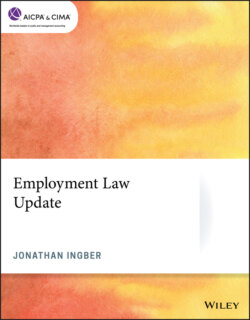Читать книгу Employment Law Update - Jonathan Ingber - Страница 31
Invalidation of a major source of financial security for labor unions in the public sector
ОглавлениеThe U.S. Supreme Court in the 2017–2018 term decided its most anticipated labor case in decades.18 Janus v. American Federation of State, County, and Municipal Employees (AFSCME), in a 5 to 4 majority opinion, Associate Justice Alito's opinion ended with these words: “Abood19 was wrongly decided and is now overruled.” At issue was the “agency fee” that nonmembers of a union must contribute to union coffers to cover expenditures that assist in the collective bargaining process, but specifically excludes expenditures related to political and ideological projects, holding that such a requirement is violative of the first amendment rights of such nonmembers. As public employees, the end result of union and governmental employer negotiations affects a state's budget crisis, taxes, education, child welfare, healthcare, and minority rights. In a powerfully written dissent, Associate Justice Kagan argued: “[1] The workplace remains both the context and subject matter of expression. If all that speech really counted as ‘of public concern,’ as the majority suggests, the mass of public employees' complaints (about pay and benefits and workplace policy and such) would become ‘federal constitutional issue[s].” “[2] And so the key point about today's decision is that it creates an unjustified hole in the law, applicable to union fees alone. This case is sui generis (unique) among those addressing public employee speech — and will almost surely remain so.” “[3] Respecting stare decisis means sticking to some wrong decisions.” “[4] Stare decisis (the idea) that ‘today's Court should stand by yesterday's decisions’—is ‘a foundation stone of the rule of law.’” And finally, “[5] The majority is likewise wrong in invoking ‘workability’ as a reason for overruling Abood. Does Abood require drawing a line? Yes, between a union's collective bargaining activities and its political activities. Is that line perfectly and pristinely ‘precis[e],’ as the majority demands? Well, not quite that — but as exercises of constitutional line drawing go, Abood stands well above average.”
